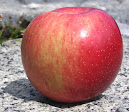
|
| A cordon of crab apple trees, growing at a 45-degree angle, at Keepers Nursery in East Farleigh, Kent, England. |
An orchard grows fruit, but a nursery grows wood.
That wood may blossom in the spring and bear fruit in the fall, but the nursery is in the business of trees.
Last month I visited Keepers Nursery, in the heart of apple country in southeast England.
Keepers is a one-person operation in the town of East Farleigh, on the south side of the river Medway in Kent.
The person is Karim Habibi, below with a printout of his vast inventory.

|
| Karim Habibi is the owner and manager of Keepers Nursery. |
It's a small operation that punches far above its weight, with perhaps the largest selection of apple trees in the United Kingdom.
Saplings, bespoke and otherwise
Once the graft has set, he will plant your sapling. It will need a year to grow. He'll dig it up and send it to you, dormant but living and ready to plant, in the middle of its second winter.
Order by the end of June and you'll only have to wait a year and a half for the tree. Wait much more than that and it will be two and a half years.
As many as 225 of the more popular apples and crabs may be "in stock" as sapling trees, not just wood, already grafted to rootstock and in the ground. They'll be ready to ship this winter.
(As of this writing some 80 "in stock" varieties have sold out for this year.)
Small shop, big selection
His clientele is often the home gardener, seeking heritage varieties or modern fruit that is disease resistant and easy to grow. Some want to plant the apples they recall from their childhood.
Keepers is a good bet for that. Karim grows wood for more than 950 varieties of apples, pears, and other pomme fruit. That includes apple varieties from all over the world.

|
| Cordons of apple trees, head on, at Keepers. The cordons are about 5 feet tall. |
Maidens
Not only are the younger trees less work for Karim, they are better for the orchardists who buy them.
Maidens have smaller and more flexible roots that are easier to ship and to plant, and more likely to survive in their new homes.
The roots, which began life as rootstock, are three to four years old by the time Karim ships them.
For the Birds
What becomes of the apples that grow, almost as an afterthought, as byproduct of the nursery business?
Karim was generous with his time, and I walked away with not quite a score of his apples. He and his family also enjoy them. But that barely makes a dent.
"Sometimes I give apples to a local charity for juicing," he says, and he opens the nursery to the public for one day each year to raise funds for a local sports club.
He also features his apples on his YouTube channel. "But mostly, the badgers, foxes, and birds eat them."

Amazing variety of apples a real treasure trove.
ReplyDelete